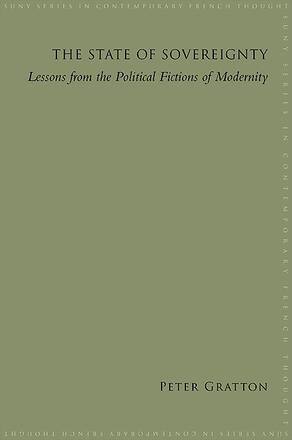
The State of Sovereignty
Lessons from the Political Fictions of Modernity
Alternative formats available from:
Considers the problems of sovereignty through the work of Rousseau, Arendt, Foucault, Agamben, and Derrida.
Description
Following up on the fables and stories surrounding political sovereignty—once theological, now often nationalist—Peter Gratton's The State of Sovereignty takes aim at the central concepts surrounding the post-9/11 political environment. Against those content to conceptualize what has been called the "sovereign exception," Gratton argues that sovereignty underwent profound changes during modernity, changes tracked by Rousseau, Arendt, Foucault, Agamben, and Derrida. Each of these thinkers investigated the "fictions" and "illusions" of claims to sovereign omnipotence, while outlining what would become the preeminent problems of racism, nationalism, and biopower. Gratton illustrates the principal claims that tie these philosophers together and, more importantly, what lessons they offer, perhaps in spite of themselves, for those thinking about the future of politics. His innovative readings will open new ground for new and longtime readers of these philosophers alike, while confronting how their critiques of sovereignty reshape our conceptions of identity, freedom, and selfhood. The result not only fills a long-standing need for an up-to-date analysis of the concept of sovereignty but is also a tour de force engaging readers in the most important political and philosophical questions today.
Peter Gratton is Assistant Professor of Philosophy at Memorial University of Newfoundland and the coeditor (with John Panteleimon Manoussakis) of Traversing the Imaginary: Richard Kearney and the Postmodern Challenge.
Reviews
"Gratton's methodological rigour in reconstructing each pathway is a great strength of the book … This is a very pedagogical book, full of lessons in the way it treats each of the authors under discussion. It is therefore a good graduate student text, and for each discussed author the book makes significant contributions to current scholarship." — Philosophy in Review
"Drawing on eminent thinkers including Boulainvilliers, Rousseau, Arendt, Foucault, Agamben, and Derrida, Gratton … provides a novel synthesis. He concludes that for those who believe in freedom and democracy, questioning rather than resigning to sovereignty as it presents itself is essential. The book reflects some of Gratton's earlier published work and further attests to his facility with French political thought … Gratton's discussion overall is penetrable and stimulating." — CHOICE